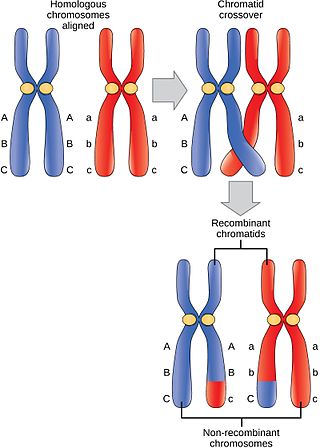All my life I've been told by almost everyone that I meet, "You look so much like your dad!" At the same time, my sister has been told, "You look so like your mom!" And we were both told, "You and your sister look so much alike!" That confused me as a kid, if I look like my dad and my sister looks like my mom, how can we look alike?
I'm sure this is not an unusual occurrence, a lot of people know that they look like their family members, what many people do not know, however, is who they are most related to. Now you might be thinking, "What, I'm related equally to both of my parents, so I'm equally related to all of my grandparents, 25% each," and the truth is...that's not necessarily true.
To prepare for the division, the cell's DNA first replicates, so that there are two identical copies of each chromosome. The cell then divides (for more information on how the cell divides click here) and results in two daughter cells. Those cells then divide, without replicating their DNA, leaving four genetically unique haploid daughter cells (Well, for males it is four, for females the cytoplasm is unevenly divided, so that one cell gets the majority of the nutrients and the other cells are polar bodies and remain unused--females get one usable egg out of the whole process).
The main sources of genetic differences from the original cell come from two processes that occur before the first division. The first process creates recombinant chromosomes. The duplicated chromosomes line up together with the corresponding chromosome from the other parent, and they switch pieces of their DNA (see image below), this creates a completely unique set of chromosomes. This means that when the DNA is divvied, and later contributes to the zygote, that DNA can be in any percentage from each grandparent. So, you could be 41.6% of your father's mother and only 17.3% of your mother's father.
https://www.differencebetween.com/difference-between-parental-type-and-vs-recombinant-type-chromosomes/
The other process that contributes to genetic individuality is independent assortment, which means that when your chromosomes line up during meiosis, they line up in a random order. This means that the chromosomes line up in any order and either chromosome from the pair (either from the mother or father), can go to either of the new cells. Just to help you sort this all out, I'm talking about how the egg and sperm are made. So when I say mother or father's chromosome during meiosis, that corresponds to the grandparents' chromosomes for the baby, which resulted from the fusion of egg and sperm.
These processes mean that the likelihood of you being you are incredibly low. If we do not consider recombination or the likelihood of that specific egg dropping and that specific sperm meeting it, and we just consider independent assortment you are about one in 70 trillion! So, it's actually insulting when someone says you're one in a million!
It is said that there are six other people on the earth that look almost exactly like you, but the truth is that the probability of even your siblings being identical to you (unless you are twins) is incredibly low, so you truly are unique!
More info/helpful links
Meiosis
Diploid
Haploid
For information on cell division
Recombinant Chromosomes
Independent Assortment
It is said that there are six other people on the earth that look almost exactly like you, but the truth is that the probability of even your siblings being identical to you (unless you are twins) is incredibly low, so you truly are unique!
More info/helpful links
Meiosis
Diploid
Haploid
For information on cell division
Recombinant Chromosomes
Independent Assortment

No comments:
Post a Comment